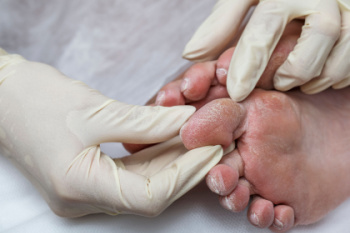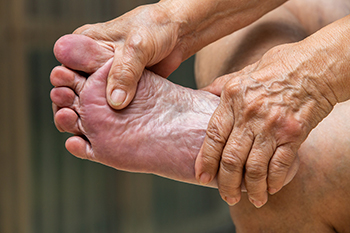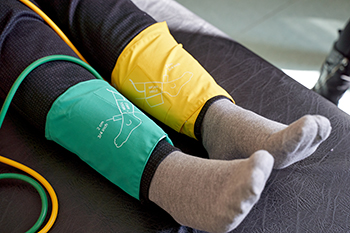Merrillville, IN
Munster, IN
December 2024
How Diabetes Affects the Feet

Diabetes can significantly impact the health of the feet, leading to complications that may affect the toes, feet, and ankles. Over time, high blood sugar levels can damage the peripheral nerves, a condition known as diabetic neuropathy. This nerve damage can cause tingling, pain, or loss of sensation, which makes it difficult to notice injuries like blisters or cuts. When unnoticed and untreated, these minor issues can develop into infections or ulcers. Diabetes also can impair blood circulation to the feet, reducing the ability to heal and increasing the risk of gangrene in severe cases. People with diabetes may also develop foot deformities, such as Charcot's foot, which causes swelling and bone changes that alter the shape of the foot. Preventive measures are essential, including regular inspections by a podiatrist, along with improved daily foot care habits. A podiatrist can monitor your feet for early signs of complications and offer appropriate wound care treatment as needed. If you have foot problems as a complication of diabetes, it is suggested that you schedule regular appointments with a podiatrist for an exam, diagnosis, and treatment.
Diabetic foot care is important in preventing foot ailments such as ulcers. If you are suffering from diabetes or have any other concerns about your feet, contact Ahmad Elsamad, DPM from The Institute of Foot & Ankle Reconstructive Surgery . Our doctor can provide the care you need to keep you pain-free and on your feet.
Diabetic Foot Care
Diabetes affects millions of people every year. The condition can damage blood vessels in many parts of the body, especially the feet. Because of this, taking care of your feet is essential if you have diabetes, and having a podiatrist help monitor your foot health is highly recommended.
The Importance of Caring for Your Feet
- Routinely inspect your feet for bruises or sores.
- Wear socks that fit your feet comfortably.
- Wear comfortable shoes that provide adequate support.
Patients with diabetes should have their doctor monitor their blood levels, as blood sugar levels play such a huge role in diabetic care. Monitoring these levels on a regular basis is highly advised.
It is always best to inform your healthcare professional of any concerns you may have regarding your feet, especially for diabetic patients. Early treatment and routine foot examinations are keys to maintaining proper health, especially because severe complications can arise if proper treatment is not applied.
If you have any questions please feel free to contact our offices located in Merrillville, and Munster, IN . We offer the newest diagnostic and treatment technologies for all your foot and ankle needs.
Foot Care for Seniors

As we age, our feet go through changes like thinning skin, reduced cushioning, and decreased circulation, making them more vulnerable to pain, dryness, and injuries. Conditions like arthritis, bunions, and toenail problems are also more common in older adults. Proper foot care is essential to maintain mobility and overall health. Elderly individuals may struggle to care for their feet due to limited flexibility or vision. Family members and caregivers can help by checking for signs of issues like sores, swelling, or changes in skin or nail appearance. Regularly moisturizing, trimming toenails properly, and ensuring comfortable, supportive footwear can prevent problems. A podiatrist plays a vital role in elderly foot care by diagnosing and treating issues early. They can provide professional nail care, manage chronic conditions, and recommend orthotics to support aging feet. If you are a senior or helping to take care of one, it is suggested that you schedule regular appointments with a podiatrist for care.
Proper foot care is something many older adults forget to consider. If you have any concerns about your feet and ankles, contact Ahmad Elsamad, DPM from The Institute of Foot & Ankle Reconstructive Surgery . Our doctor can provide the care you need to keep you pain-free and on your feet.
The Elderly and Their Feet
As we age we start to notice many changes in our body, but the elder population may not notice them right away. Medical conditions may prevent the elderly to take notice of their foot health right away. Poor vision is a lead contributor to not taking action for the elderly.
Common Conditions
- Neuropathy – can reduce feeling in the feet and can hide many life-threatening medical conditions.
- Reduced flexibility – prevents the ability of proper toenail trimming, and foot cleaning. If left untreated, it may lead to further medical issues.
- Foot sores – amongst the older population can be serious before they are discovered. Some of the problematic conditions they may face are:
- Gouging toenails affecting nearby toe
- Shoes that don’t fit properly
- Pressure sores
- Loss of circulation in legs & feet
- Edema & swelling of feet and ankles
Susceptible Infections
Diabetes and poor circulation can cause general loss of sensitivity over the years, turning a simple cut into a serious issue.
If you have any questions please feel free to contact our offices located in Merrillville, and Munster, IN . We offer the newest diagnostic and treatment technologies for all your foot and ankle needs.
Foot and Ankle Joint and Tissue Disorders

Musculoskeletal conditions of the foot and ankle, such as arthritis, tendonitis, and deformities like bunions or flat feet, often evolve gradually but can significantly challenge the quality of life. These conditions frequently arise from wear and tear, injury, genetic predisposition, or underlying issues like diabetes or obesity. Over time, inflammation, joint damage, or altered biomechanics can lead to pain, stiffness, and reduced mobility. Simple activities like walking or standing may become difficult, limiting independence and daily function. As symptoms progress, compensatory gait changes can strain other joints, leading to knee, hip, or back pain. Chronic discomfort may also impact mental well-being. If you have foot or ankle pain, it is suggested that you visit a podiatrist for a prompt diagnosis and treatment to avoid negative effects on the quality of your life.
Arthritis can be a difficult condition to live with. If you are seeking treatment, contact Ahmad Elsamad, DPM from The Institute of Foot & Ankle Reconstructive Surgery . Our doctor can provide the care you need to keep you pain-free and on your feet.
Arthritic Foot Care
Arthritis is a term that is commonly used to describe joint pain. The condition itself can occur to anyone of any age, race, or gender, and there are over 100 types of it. Nevertheless, arthritis is more commonly found in women compared to men, and it is also more prevalent in those who are overweight. The causes of arthritis vary depending on which type of arthritis you have. Osteoarthritis for example, is often caused by injury, while rheumatoid arthritis is caused by a misdirected immune system.
Symptoms
- Swelling
- Pain
- Stiffness
- Decreased Range of Motion
Arthritic symptoms range in severity, and they may come and go. Some symptoms stay the same for several years but could potentially get worse with time. Severe cases of arthritis can prevent its sufferers from performing daily activities and make walking difficult.
Risk Factors
- Occupation – Occupations requiring repetitive knee movements have been linked to osteoarthritis
- Obesity – Excess weight can contribute to osteoarthritis development
- Infection – Microbial agents can infect the joints and trigger arthritis
- Joint Injuries – Damage to joints may lead to osteoarthritis
- Age – Risk increases with age
- Gender –Most types are more common in women
- Genetics – Arthritis can be hereditary
If you suspect your arthritis is affecting your feet, it is crucial that you see a podiatrist immediately. Your doctor will be able to address your specific case and help you decide which treatment method is best for you.
If you have any questions, please feel free to contact our offices located in Merrillville, and Munster, IN . We offer the newest diagnostic and treatment technologies for all your foot care needs.
Chronic Kidney Disease and the Feet

Chronic kidney disease, or CKD, has a significant impact on foot health, often leading to complications that require vigilant care. Poor kidney function affects blood flow and can contribute to peripheral artery disease, reducing circulation to the legs and feet. This diminished blood flow slows the healing process, increasing the risk of ulcers, especially in people with diabetes, a common condition in CKD patients. Reduced kidney function also leads to fluid retention, causing swelling in the feet and ankles, which can be painful and limit mobility. Additionally, CKD affects the body’s ability to regulate calcium and phosphorus, weakening bones and potentially causing fractures in the feet. Since CKD can dull sensation due to nerve damage, it may delay the detection of injuries or infections. If you have chronic kidney disease, it is suggested that you include a podiatrist on your team of doctors as regular foot exams and preventive care are essential for the best quality of life.
When dealing with systemic disease of the feet, it is extremely important to check the affected areas routinely so that any additional problems are caught quickly. If you have any concerns about your feet and ankles contact Ahmad Elsamad, DPM from The Institute of Foot & Ankle Reconstructive Surgery . Our doctor will assist you with all of your podiatric needs.
Systemic Diseases of the Feet
Systemic diseases affect the whole body, and symptoms usually are displayed in the feet. This condition can make a patient’s ability to walk unbearable. Systemic diseases include gout, diabetes mellitus, neurological disorders, and arthritis.
Gout – is caused by an excess of uric acid in the body. Common symptoms include pain, inflammation, and redness at the metatarsal/phalangeal joint of the base big toe. Gout can be treated by NSAIDs to relieve pain and inflammation, and other drugs that lower the acid levels in the body.
Diabetes mellitus – is an increase in the level of blood sugar that the body cannot counteract with its own insulin. Failure to produce enough insulin is a factor in Diabetes.
Diabetes of the Feet
Diabetic Neuropathy – may lead to damaged nerves and affect the feet through numbness and loss of sensation.
Peripheral Vascular Disease – can restrict the blood flow to the feet, and often times lead to amputation of the feet.
If you have any questions please feel free to contact our offices located in Merrillville, and Munster, IN . We offer the newest diagnostic and treatment technologies for all your foot and ankle needs.
Running Injury Prevention Tips

Preventing running injuries involves a combination of strategies focused on safe progression and proper technique. One key approach is to increase mileage gradually, allowing the body to adapt to the demands of longer distances without overwhelming muscles and joints. This gradual increase reduces the risk of overuse injuries like stress fractures or tendinitis. Proper running form is also essential to minimize strain on the body. Maintaining an upright posture, landing with a midfoot strike, and avoiding overstriding can reduce the impact on your knees, hips, and lower back. Additionally, incorporating smarter workouts, such as cross-training, strength exercises, and rest days, helps balance the repetitive nature of running. A well-rounded training routine allows muscles to recover, build strength, and improve flexibility, further reducing the risk of injury. If you have endured a foot or ankle injury while running, it is suggested that you confer with a podiatrist who can offer treatment solutions, and guide you on additional injury prevention techniques.
All runners should take extra precaution when trying to avoid injury. If you have any concerns about your feet, contact Ahmad Elsamad, DPM of The Institute of Foot & Ankle Reconstructive Surgery . Our doctor will treat your foot and ankle needs.
How to Prevent Running Injuries
There are a lot of mistakes a runner can make prior to a workout that can induce injury. A lot of athletes tend to overstretch before running, instead of saving those workouts for a post-run routine. Deep lunges and hand-to-toe hamstring pulls should be performed after a workout instead of during a warmup. Another common mistake is jumping into an intense routine before your body is physically prepared for it. You should try to ease your way into long-distance running instead of forcing yourself to rush into it.
More Tips for Preventing Injury
- Incorporate Strength Training into Workouts - This will help improve the body’s overall athleticism
- Improve and Maintain Your Flexibility – Stretching everyday will help improve overall performance
- “Warm Up” Before Running and “Cool Down” Afterward – A warm up of 5-10 minutes helps get rid of lactic acid in the muscles and prevents delayed muscle soreness
- Cross-Training is Crucial
- Wear Proper Running Shoes
- Have a Formal Gait Analysis – Poor biomechanics can easily cause injury
If you have any questions, please feel free to contact our offices located in Merrillville, and Munster, IN . We offer the newest diagnostic and treatment technologies for all your foot care needs.








